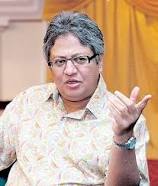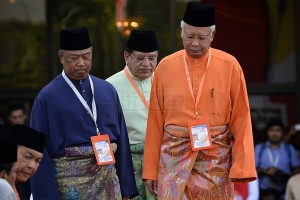by Dato’ Zaid
We have often heard the phrase ‘we must change our lifestyles’ and the truth is that it will be difficult to adjust – but adjust we must.
PREDICTING the future is always a hazardous act: we can be correct on some insignificant things but we invariably miss the big ones.
Before this year, who could have anticipated the rise of the so-called Islamic State of Iraq and Syria? Who could have predicted that Russia would swallow up Crimea and try to annexe eastern Ukraine? Who could have foreseen the two terrible tragedies of MH370 and MH17?
 I do not wish to make any kind of forecast for the world in 2015 because it would be pointless – but I have a “wish list” for Malaysia that will make me happy if it is fulfilled.
I do not wish to make any kind of forecast for the world in 2015 because it would be pointless – but I have a “wish list” for Malaysia that will make me happy if it is fulfilled.
I wish our leaders at all levels would come together and ponder what it would be like if our country were to face a deep economic crisis.
I am no alarmist but experience teaches us that once-wealthy countries can suddenly become poor due to a variety of factors: we should not forget the economic crises that have plagued Argentina and Brazil as well as, more recently, Ireland, Greece, Spain and other countries caught in the European sovereign debt problem.
A similar fate could befall us and I believe our leaders must determine if, in 2015, some “cuts” should be put in place so that we can start living within our means again.
For this to happen, however, we must agree on what constitutes “unnecessary spending”. Next year will be economically tough according to most analysts because our oil revenue will likely be reduced by as much as 40% – and possibly more.
In addition, other commodity prices are also expected to be depressed for long periods. The value of the ringgit will be much lower than it was 2013-14, making our imports (including food) more expensive while real wages remain stagnant.
As such, civil servants and technocrats at the apex of the bureaucracy must be willing to make unpopular decisions, such as budget cuts, early so that we can save enough to pay for essential services.
As it is, some of us will have difficulty adjusting to lower income levels because this is “unfamiliar territory”: as a rich country that has enjoyed many years of uninterrupted growth, some of us have a propensity to be lavish, spending consistently more than what we earn, while others have already gone into debt just to get by from one day to the next.
We have often heard the phrase “we must change our lifestyles” and the truth is that it will be difficult to adjust – but adjust we must if we do not want bigger complications to emerge later. In this sense, nations are like individuals: they have difficulty changing their habits but reality must be faced head-on.
It’s not just the Government in Putrajaya that will have to adapt. Those in the private sector must also do the same, for currently the trend among corporations is to invest heavily abroad.
Some have done so with the clear intention of keeping their money overseas, and we can’t do much about that unless Bank Negara becomes more meticulous about what kind of overseas funds transfers it allows.
Other corporations are investing abroad because they are just following the trend – overseas deals are seen as successful and profitable for these companies and it is also prestigious to be involved in businesses in London, Saudi Arabia, Melbourne, Beijing and so forth.
The commissions are attractive for the deal-makers and the returns on foreign investments might be better than those available in our own country – but perhaps corporations should remember that risks abroad are also quite different compared to those at home.
Investing abroad also provides top Malaysian executives the opportunity to spend time in the wonderful capitals of the world but those tasked with specific socio-economic mandates (such as Tabung Haji, the Armed Forces Fund and the Employees Provident Fund) must never forget their duty to help the members and society at large and not get carried away by their business ventures.
In these perilous times, it makes more social sense to invest in Malaysia. Those of us with the means to do so should take active steps to help our country keep its head above water. In fact, why not stop investing overseas altogether, at least until the storm passes?
More investments should be directed to small towns, enterprises and industries where profits are still possible but – much more importantly – capital stimuli will go a much longer way in terms of developmental impact.
Likewise, private education in Malaysia has become completely unaffordable for most families, although the nation needs an increasing number of tertiary graduates if we are to close the income gap in the future.
Investing in private education can make it more affordable, while investing in public education can help raise the much maligned standards of national and national-type schools – although in the latter case, the Government must first admit that there is a very serious problem and be receptive to external support.
Corporations with socio-economic responsibilities should look at ways to help educate people rather than be interested only in investments in London and elsewhere. Surely investing in our own future is an obvious priority?
As for cost cutting, I suggest we start with small changes that can then develop into a culture.
Just the other day, I was driving along a main thoroughfare but was pushed to the side of the road by traffic police accompanying a royal family – there were eight police outriders and a large number of cars escorting the royal vehicle.
I suggest we reduce such escorts to two outriders. This will result in huge savings and the police can be deployed elsewhere while our royalty will still be protected with dignity: Queen Elizabeth II, for example, is quite happy with the modest escort that she has following her.
Other cost cutting should include barring public officials from claiming travel expenses if their travels are primarily for personal or political purposes. More stringent checks should be made and there must a general willingness to stop the abuse of government funds.
I have seen some politicians using government vehicles and making claims on their travels when they were actually on election campaigns or attending to party matters – as a camouflage, they sometimes arrange meetings with a local government department. This practice should be stopped immediately.
The way to curb abuses is to train our people the value of integrity and compliance with the rules.
It’s high time that we learn to differentiate between government, party and personal functions. In the good old days we could be less particular about this distinction because we had a lot of money. That is no longer the case.
Finally, in 2015 I hope to see our newspapers producing more stories about the lives of ordinary Malaysians.
It’s true our news agencies are required to give full coverage to some leaders, or fill their pages with stories about the rich and famous (because people want to read about them – particularly if there is something juicy or scandalous involved).
But media owners could also give more space to the stories of ordinary people that might be inspiring or interesting to read, and I believe that we will need more of such stories in difficult times.
The recent endeavour by Universiti Sains Kelantan to establish a full symphony orchestra was extraordinary and worthy of support and congratulation – but there was nothing about it in the press.
Who would have thought that the students and academics in Kelantan could get together to learn music and then give their full attention to staging a successfully symphonic performance of (among other things) Getaran Jiwa to an appreciative public?
So, while we call our public officials and corporations to account, let’s also focus on the wonderful things done by the rakyat that can help us be more positive about the future.
We will certainly need more optimism in the days to come. Of that, I am sure.
Datuk Zaid Ibrahim, true to his Kelantan roots, is highly passionate about practically everything, hence the name of this column. Having established himself in the legal fraternity, Zaid ventured into politics and has been on both sides of the political divide. The former de facto Law Minister at one time is now a legal consultant but will not hesitate to say his piece on any current issue. He can be reached at carbofree@gmail.com.The views expressed here are entirely his own.




No comments:
Post a Comment
Note: Only a member of this blog may post a comment.